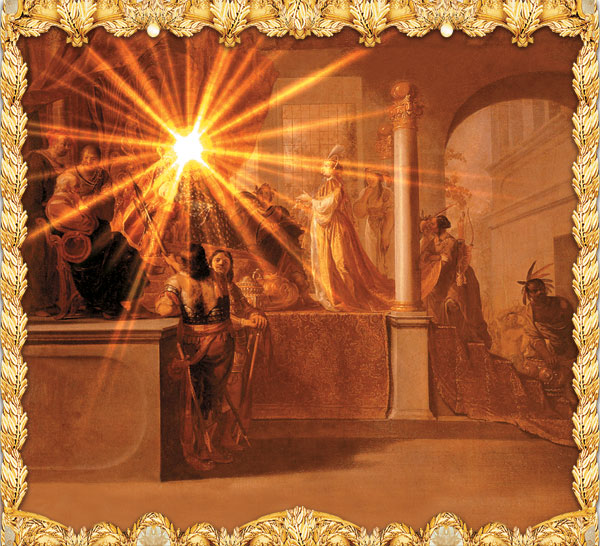Abiding by the Qur'an leads one to the right path, for "News has come to them that contains a threat: consummate wisdom..." (Surat al-Qamar: 4-5). In another verse, Allah reminds us that the Qur'an's verses and accounts of past people provide many examples and much advice: "There is instruction in their stories for people of intelligence. This is not a narration that has been invented, but a confirmation of all that came before, a clarification of everything, and a guidance and a mercy for people who believe" (Surah Yusuf: 111).
Allah mentions the devout women who submitted to Him from the depth of their hearts so that believers could learn about their exemplary character traits and then emulate them. Also, these verses speak of women who persist in their unbelief despite being invited to believe, and thus distance themselves from His mercy.
In the following pages, we will explore the good character examples of the devout Muslim women mentioned in the Qur'an and reveal the features of those unbelieving women who became lost in denial. We can learn several important lessons from those who either could not or would not comprehend the superiority of faith despite being under the protection of Prophets.

Allah mentions two female role models for believers: Mary and Pharaoh's wife. From the very beginning of this book, we have shown how Allah chose Mary above all other women because of her chastity, heart-felt devotion to Him, and strong faith in Him. The character of Pharaoh's wife is described below:
Allah has made an example for those who believe: the wife of Pharaoh, when she said: "My Lord, build a house in the Garden for me in Your Presence, rescue me from Pharaoh and his deeds, and rescue me from this wrongdoing people." (Surat at-Tahrim: 11)
Pharaoh's wife is another role model for believing women. She witnessed from close up Pharaoh's violent nature, the extremes to which he took his denial, and how he oppressed the Jews.
As "Pharaoh was high and mighty in the land. He was one of the profligate" (Surah Yunus: 83) reveals, Pharaoh was a merciless and wicked man who subjected his people to violence. For example, he did not harm women but killed their male children. This punishment was unbearable. All of Egypt belonged to him, and he lived in great wealth and grandeur. No one dared to disagree with him or rebel against him, for he was, by Egyptian tradition, claiming to be the god of the Egyptians and the Israelites.
Allah sent the Prophet Moses (pbuh) as a reminder to Pharaoh and as a savior to the Israelites. Upon the Prophet Moses' (pbuh) inviting the Egyptians to Allah's true religion and calling them to forsake their idols for Allah, Pharaoh threatened everyone that: "If you take any god other than me, I will certainly throw you into prison" (Surat ash-Shu'ara': 29). As a result, only a few young people believed: "No one believed in Moses, except for a few of his people, out of fear that Pharaoh and the elders would persecute them" (Surah Yunus: 83). Some people who answered the Prophet Moses' (pbuh) call to faith by believing in him came face to face with Pharaoh's wicked and violent methods:
Pharaoh said: "Have you believed in him before I authorized you to do so? This is just some plot you have concocted in the city to drive its people from it. I will cut off your alternate hands and feet, and then I will crucify every one of you." (Surat al-A'raf: 123-124)

The reason for such cruelty is revealed in another verse:
[The magicians said:] "You are only avenging yourself on us because we believed in our Lord's Signs when they came to us. Our Lord, pour down steadfastness upon us and take us back to You as Muslims." (Surat al-A'raf: 126)
Pharaoh's wickedness toward people who rejected his rule by believing in Allah was clearly visible. But his wife, despite knowing all of this, did not fear Pharaoh's retribution or cruelty, for she considered winning Allah's good pleasure, love, and closeness to be far more important. Her devotion and submission to Him, as well as the patience, faith, and courage that she showed while concealing her belief under difficult circumstances, are exemplary lessons for all believers.
In addition, it must not be forgotten that since only Pharaoh owned all of Egypt's treasures and gifts, she was willing to give all of these up in order to win Allah's good pleasure and living by Islamic morality. In other words, she considered all of her husband's possessions worthless. Her sincerity is clearly visible in her prayer:
... when she said: "My Lord, build a house in the Garden for me in Your Presence, rescue me from Pharaoh and his deeds, and rescue me from this wrongdoing people." (Surat at-Tahrim: 11)
Her superior character proved that she was not attached to this worldly life but only desired Allah's good pleasure, mercy, and Paradise. Allah relates her genuine faith as an example for all Muslims and made her superior in both worlds.
Allah reveals that Pharaoh was a transgressor, a wicked ruler who oppressed his people and slaughtered the male children of his nation:
Pharaoh exalted himself arrogantly in the land and divided its people into camps, oppressing one group by slaughtering their sons and letting their women live. He was one of the corrupters. (Surat al-Qasas: 4)
The Prophet Moses (pbuh) was born in Egypt during this oppressive rule. Allah chose him and commanded him to struggle against Pharaoh's oppression. Allah informed his mother that she should protect him:
When We revealed to your mother: "Place him into the box and place it upon the sea. The sea will wash it up on the shore, where an enemy of Mine and his will pick it up." (Surah Ta Ha: 38-39)
We revealed to Moses's mother: "Suckle him and then when you fear for him, place him upon the sea. Do not fear or grieve; We will return him to you and make him one of the Messengers." (Surat al-Qasas: 7)

Nicholaus Knpfer's "The Queen of Sheba before Solomon," oil painting measuring 73.5 x 81 cm, is displayed in the Hermitage Museum, St. Petersburg, Russia.
Allah reminded the Prophet Moses' (pbuh) mother not to fear or grieve. Rather, she was to put her newborn baby into a box and then place it upon the water. Carrying out such an order requires one to have a most genuine faith and trust in Allah, not to mention submission. But his mother was tried with such an event and passed this test, which revealed her superior character as well as her devotion to and trust in Him. Thus, she became an example for all believers until the Day of Judgment.
After she had carried out His order, and knowing that this test would try her to the limits, Allah strengthened her heart with patience and perseverance:
Moses's mother felt a great emptiness in her heart and she almost gave him away; only We fortified her heart so that she would be one of the believers. (Surat al-Qasas: 10)
As revealed in the following verse, the Prophet Moses' (pbuh) mother asked his sister to follow him without being seen so that she could know what happened to her son: "She said to his sister, 'Go after him.' She kept an eye on him from afar, and they were not aware" (Surat al-Qasas: 11).
Allah determined a destiny for the Prophet Moses (pbuh) and created everything so that it would unfold as He willed. He had the Prophet Moses (pbuh), who was to fight Pharaoh, brought to his palace and raised by his family. Allah also had him suckled by his true mother, for his sister advised Pharaoh's family to raise him and suggested her own mother as his wetnurse:
We first made him refuse all wetnurses, so she asked: "Shall I show you to a household who will feed him for you and be good to him?" (Surat al-Qasas: 12)
Subsequently, Allah reunited the Prophet Moses (pbuh) with his mother for the following reason:
That is how We returned him to his mother so that she might delight her eyes and feel no grief, and so that she would know that Allah's promise is true. But most of them do not know this. (Surat al-Qasas: 13)
As the verse makes clear, Allah tested the devotion of the Prophet Moses' (pbuh) mother and, in return for her patience, submission, and strength of character, arranged events so that she could take care of him. Allah also made this event a cause for the Prophet Moses (pbuh), who would one day assume great responsibilities in Egypt and fight to free the Israelites from Pharaoh's oppression, to be brought up in Pharaoh's palace in close proximity to him. Allah reveals:
The family of Pharaoh picked him up so that he might be an enemy and a source of grief to them. Certainly Pharaoh, Haman, and their troops were in the wrong. (Surat al-Qasas: 8)
The wife of Pharaoh said: "A source of delight for me and for you; do not kill him. It may well be that he will be of use to us, or perhaps we could adopt him as a son." They were not aware. (Surat al-Qasas: 9)
Allah creates everything according to a specific destiny and tries people with events within this destiny. As He reveals, our Lord gives good news to those who are patient, as in the case of the Prophet Moses' (pbuh) mother, and will guide them to goodness with His mercy:
We will test you with a certain amount of fear and hunger, and loss of wealth, life, and fruits. But give good news to the steadfast. (Surat al-Baqara: 155)

Allah reveals that after leaving Egypt, the Prophet Moses (pbuh) went east toward Madyan. There, he saw two women who were waiting near a well so that their animals drink. When he asked them about this, they told him that because their father was too old to do this job, they had to bring their animals. However, they had to wait because of the shepherds who were already at the water. Allah reveals this situation:
When he arrived at the water of Madyan, he found a crowd of people drawing water there. Standing apart from them, he found two women holding back their sheep. He asked: "What are you two doing here?" They said: "We cannot draw water until the shepherds have driven off their sheep. You see, our father is a very old man." So he drew water for them. (Surat al-Qasas: 23-24)
Their behavior shows that they were strictly chaste women who sought to protect themselves in environments that they considered unsafe and unbecoming. The shepherds caused them to stay away from the well. The Prophet Moses' (pbuh) trustworthy appearance convinced the women that it would be alright to speak with him. After learning of their plight, he took it upon himself to help them by watering their animals.
The behavior of these two women is a good example for all Muslim women. In spite of being in need, they preferred to guard their chastity even though it complicated matters for them. Knowing that it was more important to please Allah, they chose to wait. Consequently, Allah sent them a trustworthy person to help them.
Allah gave them a great blessing by sending the Prophet Moses (pbuh) to them, who then watered their animals and prayed: "My Lord, I am truly in need of any good You have in store for me" (Surat al-Qasas: 24). Later, one of the women returned and said that her father had invited him to his house in return for his help:
One of them came walking shyly up to him and said: "My father invites you so that he can pay you your wage for drawing water for us." (Surat al-Qasas: 25)
One of them said: "Hire him, father. The best person to hire is someone strong and trustworthy." (Surat al-Qasas: 26)
Clearly she meant to inform her father that she considered the Prophet Moses (pbuh) to be a trustworthy person. After seeing the truth of his daughter's words, their father asked him to consider marrying one of his daughters.
These women's behavior, especially their protection of their chastity, is a good example for all Muslims. In return for their devotion in this respect, Allah eased their burden with a trustworthy person and let one of them become the Prophet Moses' (pbuh) wife.
Thanks to Allah's grace and gifts, the Prophet Solomon (pbuh) established a great kingdom, one that is still admired, with his armies formed of men and jinns. His palace was built using the most advanced technologies of that era and displayed a great aesthetic style. In the Qur'an Allah relates that Balqis, the queen of Saba, entered into an economical and political dialogue with the Prophet Solomon (pbuh). No doubt, there is much wisdom and advice in this information for believers.
Allah reveals that a hoopoe in the Prophet Solomon's (pbuh) army brought him some important news about the queen of Saba:
However, it was not long delayed, and then it [the hoopoe] said: "I have comprehended something you have not and bring you accurate intelligence from Saba. I found a woman ruling over them who has been given everything. She possesses a mighty throne. I found both her and her people prostrating to the sun instead of Allah. Satan has made their actions seem good to them and debarred them from the Way, so they are not guided and do not prostrate to Allah, Who brings out what is hidden in the heavens and Earth, and knows what you conceal and what you divulge." (Surat an-Naml: 22-25)
First, the hoopoe gave the Prophet Solomon (pbuh) some information about the queen's qualities: She had everything in abundance, ruled the kingdom of Saba, and had a great throne. He drew the attention thereby to the power of her kingdom and her rule.

Based on this information, the Prophet Solomon (pbuh) wrote a letter to Balqis and invited her to believe in Allah and surrender to him. The queen immediately realized the significance of this letter and discussed it with her inner circle. This event is related in the Qur'an:
She said: "O council! A noble letter has been delivered to me. It is from Solomon and says: 'In the name of Allah, the Merciful, the Compassionate. Do not rise up against me, but come to me in submission.'" She said: "O council. Give me your opinion about this matter. It is not my habit to make a final decision until I have heard what you have to say." (Surat an-Naml: 29-32)
Her council responded: "We possess strength and great force. But the matter is in your hands, so consider what you command" (Surat an-Naml: 33). This shows that she had great power over her kingdom.
She took up the advice of her aids and chose caution:
"When kings enter a city, they lay waste to it and make its mightiest inhabitants the most abased. That is what they too will do. I will send them a gift, and then wait and see what the messengers bring back." (Surat an-Naml: 34-35)
Her primary goal was to discover his true intention. The Prophet Solomon (pbuh), who understood her strategy, rejected the gifts and sent her another message:
[Solomon said to the messenger:] "Return to them. We will come to them with troops they cannot face, and will expel them from it abased and humiliated." (Surat an-Naml: 37)
He warned her once more of his army's irresistible power and warned her to surrender. He also requested that his army's leaders bring her throne to him, for it symbolized her rule. A demon from among the jinns brought it in the time it takes to blink, and the Prophet Solomon (pbuh) then had it altered. When Balqis finally came to him, he asked her whether this throne belonged to her:
Then when she came, she was asked: "Is your throne like this?" She said: "It is exactly like it. We were given the knowledge before it, and we were submissive." And what she worshipped besides Allah impeded her. She was from an unbelieving people. (Surat an-Naml: 42-43)
In spite of being from a land of sun worshippers, the queen of Saba was quite affected by the genuine manner of the Prophet Solomon's (pbuh) letter, his rational style, power, and most impressive palace. All of this led her to believe and become a Muslim. Allah reveals her submission to him:
She was told: "Enter the courtyard." But when she saw it, she supposed it to be a pool and bared her legs. He said: "It is a courtyard paved with glass." She said: "My Lord, I have wronged myself, but I have submitted with Solomon to the Lord of all the worlds." (Surat an-Naml: 44)
This account of the queen of Saba and the Prophet Solomon (pbuh) contains wisdom and advice. The queen's ability to reason correctly enabled her to see the truth and act accordingly. In spite of her very different beliefs, she surrendered to Allah and believed in Him without hesitation when she realized the truth. This is an example of exemplary behavior.

In the Qur'an Allah also relates information about two women who denied Him and so met their final fate: an abode in Hell. They had something very important in common: Their husbands were Prophets.
Prophets were people chosen by Allah, Who honored them by making them His Messengers and increasing their physical as well as mental abilities. For this reason, it is very important to note that the wives of the Prophet Noah (pbuh) and the Prophet Lot (pbuh) did not believe, despite knowing that Prophets acted only according to true revelation and witnessing their husbands' genuine belief, good character, wise speech, and rational decisions. These two women, however, later became ungrateful and betrayed them. Allah says:
Allah has made an example for those who are an unbelieving people: the wife of Noah and the wife of Lot. They were married to two of Our servants who were believers, but they betrayed them and were not helped at all against Allah. They were told: "Enter the Fire along with all who enter it." (Surat at-Tahrim: 10)
Despite their closeness to these Prophets loved by Allah and winners of His good pleasure and Paradise, these women did not benefit from Allah's mercy. Moreover, their insincerity caused them to call His wrath upon themselves. For example, the Prophet Lot's (pbuh) wife was destroyed along with her unbelieving people:
The only response of his people was to say: "Drive the family of Lot out of your city! They are people who keep themselves pure!" So We rescued him and his family—except for his wife. We ordained her to be one of those who stayed behind. We rained down a rain upon them. How evil is the rain of those who are warned! (Surat an-Naml: 56-58)
[The angels said:] "We are going to destroy the people of this city. Truly its inhabitants are wrongdoers." He [Abraham] said: "Lot is in it." They said: "We know very well who is in it. We are going to rescue him and his family—except for his wife. She will be one of those who stay behind." When Our messengers [angels] came to Lot, he was distressed on their account, feeling incapable of protecting them. They said: "Do not fear and do not grieve. We are going to rescue you and your family—except for your wife; she will be one of those who stay behind. We will bring down on the inhabitants of this city a devastating punishment from heaven because of their deviance." (Surat al-'Ankabut: 31-34)
Both of these women were given a great opportunity in life by becoming the wives of Prophets. But neither women could convert this opportunity into a great reward in both worlds, and so they did not attain such heights. For this reason, they experienced Allah's wrath and were debased and belittled.
In the Qur'an Allah mentions the wife of an Egyptian governor. As a result of a conspiracy hatched by his brothers, the Prophet Joseph (pbuh) was sold by a trader to this Egyptian governor. Allah reveals the circumstances of his arrival in this household:
The Egyptian who had bought him told his wife: "Look after him with honor and respect. It's possible he will be of use to us, or perhaps we might adopt him as a son." And thus We established Joseph in the land to teach him the true meaning of events. Allah is in control of His affair. However, most of humanity does not know. And then when he became a full-grown man, We gave him knowledge and right judgment too. That is how We reward all doers of good. (Surah Yusuf: 21-22)

Allah placed the Prophet Joseph (pbuh) in this household. When he reached adulthood, Allah bestowed knowledge and wisdom on him, taught him how to interpret dreams, gave him preference over all others, and supported him with His grace.
Allah tested the Prophet Joseph (pbuh) in the following manner: The governor's wife tried to seduce him. As revealed in the verses, she shut the doors and made certain demands. However, the Prophet Joseph (pbuh) took refuge in Allah so that he would not commit such a sin, and turned away.
In order to change her intentions, he reminded her of her husband, who was his master, and said that he was content with him as a master and therefore could not betray him. He also told her that evildoers would not find salvation and that what she desired was evil. Allah relates the entire event in the following verse:
The woman whose house it was solicited him. She barred the doors and said: "Come over here." He said: "Allah is my refuge! He is my lord and has been good to me with where I live. Those who do wrong will surely not succeed." (Surah Yusuf: 23)
Fully aware of the limits established for humanity by Allah, the Prophet Joseph (pbuh) rebuffed her advances:
She wanted him and he would have wanted her, had he not seen the Clear Proof of his Lord. That happened so that We might avert from him all evil and lust. He was Our chosen servant. (Surah Yusuf: 24)
Say: 'Nothing can happen to us except what Allah has ordained for us. He is Our Master.
It is in Allah that the muminun should put their trust.'
(Surat at-Tawba, 51)
During this confrontation, the woman's husband entered the room. To preserve her reputation, the woman lied and, despite the Prophet Joseph's (pbuh) chaste and devout behavior, accused him of trying to seduce her, and demanded that he be punished. The Qur'anic account relates:
They raced to the door. She tore his shirt at the back. They met her husband by the door. She asked: "How should a man whose intention was to harm your family be punished for what he did, except with prison or painful punishment?" (Surah Yusuf: 25)
Clearly, she had an evil character and did not fear or respect Allah, for she sought to betray her husband by committing a sin and slandering an innocent man so that he, and not she, would be punished. This also indicates that her selfish desire overrode her conscience. In the face of these dangerous accusations, the Prophet Joseph (pbuh) told the truth: "It was she who tried to seduce me" (Surah Yusuf: 26). One of the woman's relatives made a suggestion about how to ascertain the truth:
A witness from her people then declared: "If his shirt is torn in front, she speaks the truth and he has clearly told a shameless lie. If his shirt is torn at the back, then she has lied and he has clearly told the simple truth." (Surah Yusuf: 26-27)
Following this suggestion, her husband saw that the Prophet Joseph's (pbuh) shirt was torn from behind. Therefore, it became evident that the Prophet Joseph (pbuh) had been running toward the door and that his wife had been chasing him. Allah reveals the governor's response:
He saw the shirt torn at the back and said: "The source of this is women's deviousness. Without a doubt, your guile is very great. Joseph, ignore all of this. And you, my wife, should ask forgiveness for your evil act. There is no doubt that you are in the wrong." (Surah Yusuf: 28-29)

Those who repent, those who worship, those who praise, those who fast, those who bow, those who prostrate, those who command the right, those who forbid the wrong, those who preserve the limits of Allah: give good news to the believers.
(Surat at-Tawba, 112)
As these verses make clear, the governor knew that the Prophet Joseph (pbuh) was innocent. However, this was not the end of this affair. As revealed in the following verse, word of this incident spread outside the palace: "Some city women said: 'The governor's wife solicited her servant. He's fired her heart with love. We see that she's the one to blame'" (Surah Yusuf: 30). These women were aware that the Prophet Joseph (pbuh) was not to blame, but that the governor's wife was. When the wife realized that she was the talk of the town, she began to hatch another scheme.
Seeking to prove that she could not be faulted for desiring the Prophet Joseph (pbuh) who, as revealed in the verses, was extremely handsome, she sought to make them partners in her shameful deed. She invited the women to her home. When they arrived, they were given fruit knives so that they could peel their fruit. Then she told the Prophet Joseph (pbuh) to enter the room and watched their reactions. When they saw him, they were so stunned by his handsomeness that they cut themselves. Allah reveals:
But when she heard of their malicious talk, she sent for them and made a sumptuous meal. Then she gave a knife to each of them. She said [to Joseph]: "Go out to them." When they saw him, they were amazed by him and cut their hands. They exclaimed: "Allah preserve us! This is no man. What can this be but a noble angel here!" (Surah Yusuf: 31)
The Prophet Joseph's (pbuh) handsomeness made these women remember Allah, and so they praised Him for the beauty He had created. They claimed that such beauty could not be human and that the Prophet Joseph (pbuh) must be an angel. The governor's wife admitted to them that she had sought to seduce him and that he had tried to remain chaste. Nevertheless, she repeated her desire for him in their presence once more:
She said: "You see! It's him you blamed me for. I tried to seduce him, but he refused. If he does not do what I order him, he will be put in prison and brought low." (Surah Yusuf: 32)

Her behavior exposed her wicked and ugly character. Maybe she thought that she could get away with it because of her status and wealth. She made an ugly offer, and the Prophet Joseph (pbuh) countered it by seeking refuge with Allah from her:
My Lord, the prison is preferable to me than what they call on me to do. Unless You turn their guile away from me, it may well be that I will fall for them and so become a man of ignorance. (Surah Yusuf: 33)
Allah answered his prayer and removed this conspiracy, which was set against him. The governor and all of the women who witnessed his wife's offer, despite knowing that the Prophet Joseph (pbuh) was innocent, chose to side with injustice and acted without conscience: the Prophet Joseph (pbuh) was ordered to be imprisoned, even though his innocence was clearly seen by all. He remained there for many years, as Allah reveals: "Then, after they had seen the Signs, they thought that they should still imprison him for a time" (Surah Yusuf: 35). However, this has been a blessing for the Prophet Joseph (pbuh). Allah thwarted the women's schemes and, in return for his devotion and sincerity to Him, freed the Prophet Joseph (pbuh) from prison, proclaimed his innocence, and made him a leader in Egypt.
These events contain a great deal of information that all believers should ponder. The actions of the Egyptian governor's wife and the other women clearly show how the unbelievers' conspiracies affect believers, just how determined these misguided people can be, and how they can rationalize their treachery to themselves. People who do not fear or respect Allah can easily violate their conscience, scheme against the innocent in order to achieve their selfish desires, and think nothing of slandering the innocent. As Allah reveals through this governor's words: "The source of this is women's deviousness. Without a doubt, your guile is very great" (Surah Yusuf: 28). This aspect of unbelieving women is related in other verses as follows:
Do not be like a woman who spoils the thread she has spun by unraveling it after it is strong, by making your oaths a means of deceiving one another, merely because one community is bigger than another. Allah is only testing you by this. He will make clear to you on the Day of Resurrection the things about which you differed. (Surat an-Nahl: 92)
Say: "I seek refuge with the Lord of the Daybreak, from the evil of what He has created and from the evil of the darkness when it gathers, and from the evil of women who blow on knots." (Surat al-Falaq: 1-4)
Allah warns of the wickedness of people who follow their selfish desires by conspiring, cheating, and doing evil to others. The above verse indicates that the evil of such women can be huge. However, it must never be forgotten that Allah promises to bring the conspiracies of such people to naught. A bad character always harms the one who has it. On the other hand, one's fear and respect of Allah, as well as one's righteousness, always result in Allah's help and grace.
